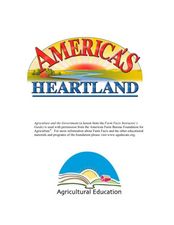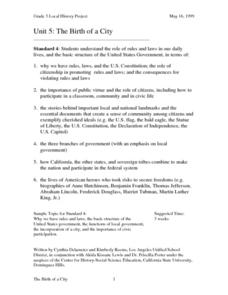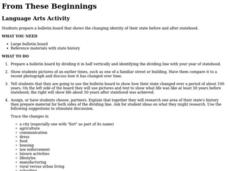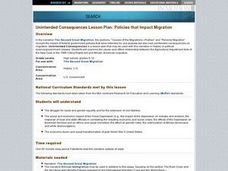Curated OER
Agriculture and the Government
Learners study the government's involvement in the U.S. A's food production and make connections relating to farm programs. In this historical agriculture instructional activity, students read content and research significant...
Curated OER
What is Deforestation?
An overview of deforestation is the focus of this resource, which present the reader with a list of facts. Ten comprehension questions follow; learners can write their answers on a separate piece of paper. Have your environmental...
Curated OER
Fresh Foods from Farm to Table
Are you a good egg? Learners begin a farm-to-table lesson by acting out verbs in groups to demonstrate the egg production process, and then research the steps using online resources. Several excellent videos are linked through the...
Curated OER
Making and Carrying Out Laws
Second graders explain the institutions and practices of governments in the United States and other countries. They explain the difference between making laws, carrying out laws, determining if laws have been violated and punishing...
Curated OER
Agricultural Economics and the American Revolution
Read through this printable version of a handout discussing Economics and the American Revolution. There are key terms and facts for learners to focus on. This case study illustrates economic principles that remain important today. See...
Learning Games Lab
Bacteria Sampling
Scholars explore the procedure for bacteria sampling in a virtual lab by first walking through a detailed step-by-step procedure of preparing the samples of raw milk and pasteurized milk, growing the bacteria, and comparing results....
Curated OER
Hot Weather, Rain Mean Fewer Pumpkins
Students share their knowledge of pumpkins, then read a news article about how hot weather and rain are affecting the pumpkin crop. In this agriculture and current events lesson, the teacher introduces the article with a discussion and...
Curated OER
The Birth of a City
Third graders understand the role of rules and laws in our daily lives. They research the basic structure of the United States government. They participate in a simulated City Council meeting.
Curated OER
From These Beginnings
Students prepare a bulletin board that shows the changing identity of their state before and after statehood.
Curated OER
We Garden: My Life as a Fruit or Vegetable
Students explore agriculture by participating in a role-play activity. In this farm to fork lesson, students ask and answer questions as though they were a specific plant about to be eaten. Students write responses to critical thinking...
Curated OER
Unintended Consequences: Policies that Impact Migration
Students examine the cause-and-effect relationship between the Agricultural Adjustment Acts of the New Deal or the 1965 Voting Rights Act and African-American migration. They write an essay evaluating the effectiveness of the Voting...
Curated OER
The True Cost of Coffee
Students examine the economic, health and environmental risks of being a one-crop country. They explain the risks of relying on one crop. They also identify the factors that resist change.
Curated OER
Telling Our Own Stories
Explore online profiles and social media with your middle and high school classes. Use blogs to inspire your class to craft a well-written, thoughtful response to a prompt you give. A few example prompts are given.
Curated OER
AFRICAN-AMERICAN HOMESTEADERS
Learners analyze the factors that inhibited and fostered African American attempts to improve their lives during Reconstruction, the role of class, race, gender, and religion in western communities, and the challenges diverse people...
Curated OER
The True Cost of Coffee
Students examine the economic, health, and environmental risks of a one-crop economy in the developing world. They explain how or why it can be challenging for people of one culture to understand the lifestyle of a different society.
Curated OER
Energy Conservation
Young scholars complete a variety of activities as they examine forms of energy, use of energy, different technologies to harness energy and the ethical implications of these sources and technologies.
Curated OER
Fortified Breakfast
Students reverse engineer a cereal. For this dietary lesson students identify the minerals that the human body needs to function. Students examine how foods are fortified by food engineers. Students find the amount of iron in a cereal by...
Teach Engineering
Introduction to Water Chemistry
What are the issues surrounding water quality? Viewers of this short presentation gain information about the importance of clean water, the lack of fresh water, water contamination, and ways that engineers treat water.
Curated OER
Environmental Exchange Box
Students examine the characteristics of their own environment and compare them to another region. They prepare a box filled with items and stories about their own region, exchange the box with another class in another region, and...
Curated OER
Map-A-Buddy
Young scholars investigate the concept of tracking and spatial movements of animals in relation to the environment in which they live. They participate in an interactive activity by tracking one another over a pre-defined region, record...
Teach Engineering
Extinction Prevention via Engineering
It's time to save endangered species through engineering. The third lesson in a nine-part Life Science unit has young environmentalists study species extinction. An engaging discussion leads to some ideas on how to use engineering design...
Learning Games Lab
Nitrogen in Fertilizer
Nitrogen is an essential element for productive farming. An interactive lesson explores the chemical makeup of different fertilizers and their corresponding nitrogen content. The interactive challenges individuals to complete...
Learning Games Lab
Nitrogen in Pollutants
Responsible farming is important for maintaining natural resources. Eager scientists complete a WebQuest to explore what happens to nitrogen when it enters the soil. They learn about the chemical makeup of nitrogen-based molecules...
Learning Games Lab
Scientific Graph Reading
Interpreting graphs is an essential skill for young scientists. An interactive online lesson gives individuals an opportunity to review the components of a graph and learn to read and interpret the shape of a graph. The lesson includes...

























